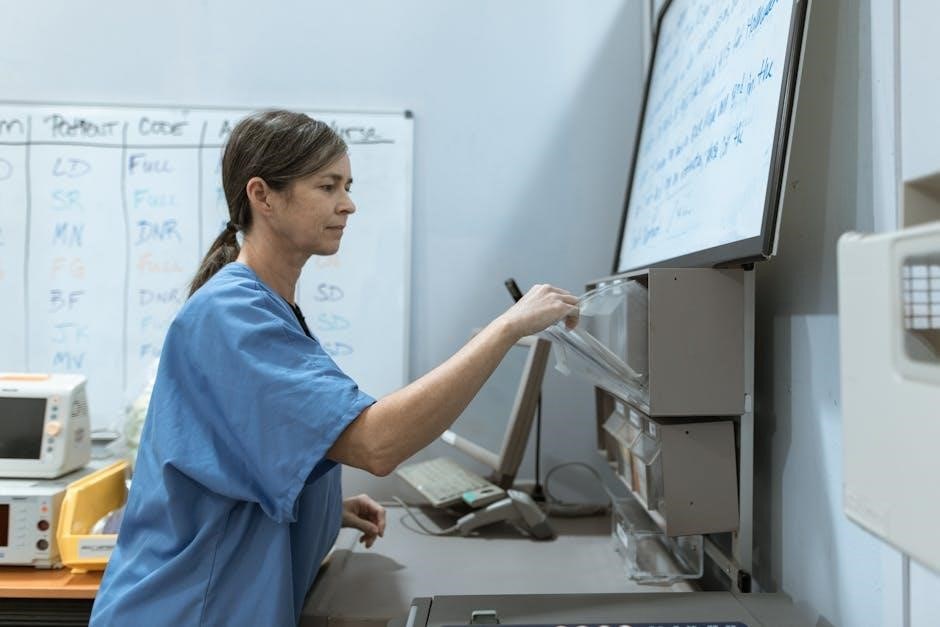Caregivers play a vital role in supporting individuals with daily tasks, providing companionship, and ensuring their well-being. Their duties range from personal care to household management, tailored to meet specific needs while maintaining dignity and independence. This section explores the foundational aspects of caregiver responsibilities, emphasizing the balance between physical support and emotional connection, essential for fostering a positive caregiving environment.
Overview of Caregiver Responsibilities
Caregivers are responsible for a wide range of tasks that support individuals in need, ensuring their well-being and independence. Duties include assisting with daily activities like bathing, dressing, and meal preparation, as well as providing emotional support and companionship. They may also manage household chores, help with mobility, and handle medical needs such as medication management. Caregivers often act as advocates, coordinating appointments and ensuring safety. Their role requires balancing physical and emotional support while maintaining professionalism and compassion. Effective caregivers adapt to individual needs, fostering a supportive and respectful environment that enhances quality of life.
Importance of Understanding Caregiver Roles
Understanding caregiver roles is crucial for ensuring effective support and maintaining the dignity of those in need. Recognizing the responsibilities helps caregivers provide tailored assistance, addressing both physical and emotional needs. It also fosters clear communication and collaboration between caregivers, families, and healthcare providers. This understanding ensures that caregivers can manage their duties efficiently while advocating for the well-being of their clients. Proper awareness of their roles also helps caregivers maintain professional boundaries and deliver compassionate, high-quality care that respects individual preferences and promotes independence.

Primary Responsibilities of a Caregiver
Caregivers primarily assist with daily living activities, providing companionship, managing households, and offering medical support. Their roles ensure clients’ well-being, dignity, and independence, adapting to individual needs.
Assisting with Activities of Daily Living (ADLs)
Assisting with ADLs is a cornerstone of caregiving, ensuring individuals maintain independence and quality of life. Caregivers help with essential tasks such as bathing, dressing, toileting, and eating, adapting support to meet specific needs. These activities are crucial for personal hygiene, mobility, and overall well-being. By providing gentle guidance and physical assistance, caregivers enable clients to perform daily routines confidently and safely. This support is tailored to preserve dignity, fostering a sense of autonomy while addressing physical or cognitive challenges. Effective ADL assistance is vital for promoting health and emotional stability in caregiving environments.
Providing Emotional and Companionship Support
Providing emotional and companionship support is a critical aspect of caregiving, addressing the emotional and social needs of individuals. Caregivers foster meaningful connections through conversation, shared activities, and emotional reassurance, helping to reduce feelings of loneliness and isolation. This support enhances mental well-being, promoting a sense of security and comfort. By being present and understanding, caregivers play a vital role in improving mood, reducing stress, and helping individuals cope with life’s challenges. This compassionate support is essential for maintaining emotional stability and overall quality of life in caregiving relationships.
Managing Household Chores and Meal Preparation
Managing household chores and meal preparation are essential caregiving duties that ensure a comfortable and safe living environment. Caregivers often handle tasks such as cleaning, laundry, and organizing living spaces to maintain order and hygiene. Meal preparation involves planning balanced nutrition, shopping for groceries, and cooking meals tailored to the individual’s dietary needs. Additionally, caregivers may assist with light housekeeping, waste management, and ensuring the home is free from hazards. These responsibilities require organizational skills, attention to detail, and the ability to efficiently manage time while prioritizing the individual’s well-being and safety.
Medical Support and Medication Management
Medical support and medication management are critical caregiving responsibilities, ensuring individuals receive proper healthcare and adhere to treatment plans. Caregivers assist with scheduling medical appointments, monitoring health conditions, and maintaining accurate records of medications and dosages. They also help with administering medications, tracking side effects, and communicating with healthcare providers. Additionally, caregivers may provide first aid, monitor vital signs, and respond to medical emergencies. Effective medication management requires attention to detail, organizational skills, and adherence to healthcare guidelines to ensure safety and prevent errors. This role is vital for maintaining the individual’s overall health and well-being.
Daily Tasks and Duties
Caregivers perform essential daily tasks, including assisting with personal care, managing household chores, and ensuring the individual’s safety and comfort. These duties are tailored to meet specific needs, fostering independence and well-being through consistent support and attention to daily routines.
Morning and Evening Care Routines
Morning and evening care routines are crucial for ensuring the well-being of individuals under a caregiver’s support. These routines typically involve assisting with waking up, personal hygiene, dressing, and preparing for the day. In the evening, caregivers help with winding down activities, such as preparing for bed, administering medications, and ensuring a safe sleep environment. Consistency in these routines helps maintain structure and comfort, promoting both physical and emotional well-being. Caregivers must adapt these routines to meet individual needs, ensuring a balance between support and independence.
Help with Dressing, Grooming, and Hygiene
Assisting with dressing, grooming, and hygiene is a fundamental aspect of caregiving. Caregivers help individuals choose appropriate clothing, ensuring comfort and practicality. Grooming support includes hair care, shaving, and nail trimming, while hygiene assistance encompasses bathing, oral care, and using the restroom. These tasks require patience and sensitivity to maintain the individual’s dignity. Proper hygiene practices are essential for preventing infections and promoting overall health. Caregivers must adapt their approach to the individual’s preferences and abilities, fostering independence where possible while providing necessary support.
Assistance with Mobility and Ambulation
Assisting with mobility and ambulation is crucial for maintaining physical activity and preventing complications. Caregivers help individuals transfer from beds to chairs, walk safely, and use assistive devices like canes or walkers. They ensure proper posture and balance to avoid falls, promoting independence and confidence. Regular movement aids in muscle strength, circulation, and joint flexibility, enhancing overall well-being. Tailored support is provided based on the individual’s needs, fostering a safe and encouraging environment for effective mobility and ambulation practices.
Light Housekeeping and Laundry Services
Light housekeeping and laundry services are essential for maintaining a clean and comfortable living environment. Caregivers typically handle tasks such as dusting, vacuuming, and organizing living spaces. Laundry duties include washing, drying, and folding clothes, ensuring the individual has a steady supply of clean attire. These services are tailored to the person’s needs, promoting hygiene and a sense of order. By managing these tasks, caregivers alleviate stress and allow the individual to focus on their well-being, creating a positive and supportive home atmosphere.
Additional Caregiving Responsibilities
Beyond daily tasks, caregivers often manage errands, shopping, and medical appointments. They ensure the individual’s safety, handle behavior management, and maintain documentation for compliance with regulations, providing comprehensive support tailored to unique needs while upholding privacy and dignity.
Running Errands and Shopping
Caregivers often handle essential errands and shopping tasks, ensuring the individual’s needs are met. This includes grocery shopping, picking up prescriptions, and running personal errands. By managing these tasks, caregivers help maintain the person’s independence and quality of life. They may also assist with organizing and budgeting for purchases, ensuring efficiency and cost-effectiveness. These responsibilities require reliability, attention to detail, and the ability to adapt to changing needs, making them a crucial part of comprehensive caregiving support.
Accompanying to Medical Appointments
Accompanying individuals to medical appointments is a key caregiver duty, ensuring they receive necessary care and support. Caregivers assist with transportation, provide emotional reassurance, and help communicate with healthcare providers. They may take notes during consultations, manage paperwork, and ensure follow-up steps are understood. This role requires strong organizational and communication skills, as well as empathy and patience. By attending appointments, caregivers play a vital role in maintaining the person’s health and well-being, often acting as an advocate to ensure their needs are met effectively.
Behavior Management and Safety Monitoring
Caregivers are responsible for managing behaviors that may pose risks to the individual or others, ensuring a safe environment. This includes monitoring for signs of distress, agitation, or unsafe actions and intervening appropriately. Techniques such as redirection, de-escalation, and positive reinforcement are often used. Safety monitoring involves checking surroundings for hazards, supervising activities, and preventing accidents. Documentation of behaviors and interventions is essential for tracking patterns and improving care strategies. This role requires patience, understanding, and the ability to balance support with safety, ensuring the individual’s well-being while maintaining a secure setting.
Documentation and Compliance with Regulations
Documentation is a critical aspect of caregiving, ensuring accurate records of daily activities, medical needs, and behavioral patterns. Caregivers must comply with state and federal regulations, maintaining confidentiality and privacy. This includes adhering to company policies and procedures, such as reporting suspicions of maltreatment. Proper documentation helps track progress, identify needs, and ensure continuity of care. Caregivers must also stay informed about legal requirements, such as mandated reporting, to uphold ethical standards and protect vulnerable individuals. Compliance ensures accountability and fosters trust between caregivers, clients, and regulatory bodies, safeguarding the quality of care provided.

Soft Skills and Qualities of a Caregiver
Effective communication and empathy are essential, enabling caregivers to understand and address clients’ needs compassionately. Patience, reliability, and trustworthiness foster a supportive environment, ensuring dignified care.
Effective Communication and Empathy
Effective communication and empathy are core competencies for caregivers, enabling them to understand and address clients’ needs compassionately. Clear verbal and non-verbal interactions ensure clients feel heard and valued. Active listening builds trust, while empathy allows caregivers to connect deeply, reducing feelings of isolation. These skills are vital for providing emotional support and fostering a positive, dignified caregiving experience. By combining understanding with compassion, caregivers can navigate complex situations, ensuring clients’ physical and emotional well-being are prioritized.
Patience and Emotional Support
Patience and emotional support are essential for caregivers, as they often work with individuals facing physical or cognitive challenges. Demonstrating patience helps clients feel secure and understood, especially during difficult moments. Emotional support involves offering encouragement, reassurance, and a comforting presence, which can alleviate anxiety and depression. Caregivers must remain calm and composed, even in stressful situations, to provide consistent and compassionate care. This fosters a trusting relationship and enhances the client’s overall well-being, making patience and emotional support cornerstone qualities in effective caregiving.
Reliability and Trustworthiness
Reliability and trustworthiness are fundamental traits for caregivers, as clients depend on them for consistent support. Caregivers must arrive on time, fulfill duties as promised, and maintain confidentiality to build trust. Demonstrating accountability and honesty fosters a safe environment, crucial for vulnerable individuals. Trustworthiness ensures clients feel secure, knowing their needs are met with integrity. These qualities are vital for forming strong, professional relationships and providing high-quality care that clients and families can rely on without hesitation.
Ability to Work Independently
Caregivers often work without direct supervision, requiring strong self-management skills to handle tasks effectively. They must assess client needs, prioritize duties, and make sound decisions independently. This autonomy demands initiative, problem-solving abilities, and adaptability to unexpected situations. The capacity to work independently ensures consistent care delivery, even in challenging environments. It also allows caregivers to tailor support to individual preferences, fostering a personalized and efficient care experience that respects client autonomy and promotes their well-being.
Legal and Ethical Considerations
Caregivers must understand their legal rights and responsibilities, maintain confidentiality, and report any suspected maltreatment. Adhering to company policies and ethical guidelines ensures proper care and compliance.
Understanding Caregiver Rights and Responsibilities
Understanding caregiver rights and responsibilities is crucial for effective advocacy. Caregivers must know their legal obligations, such as reporting maltreatment and maintaining confidentiality. They also have the right to fair treatment and support. Familiarity with company policies and state regulations ensures compliance. Additionally, caregivers should document care activities and communicate needs effectively. This balance of rights and duties fosters a respectful and ethical caregiving environment, protecting both caregivers and those they support while promoting dignity and well-being in care settings.
Maintaining Confidentiality and Privacy
Maintaining confidentiality and privacy is a fundamental aspect of caregiving. Caregivers must respect personal information and ensure it is only shared with authorized individuals. This includes securely storing records and avoiding discussions in public settings. Privacy rights should always be upheld, allowing individuals to maintain dignity and control over their personal affairs. Adhering to ethical guidelines and legal standards ensures trust and professionalism in the caregiver relationship, fostering a safe and respectful care environment for all parties involved.
Reporting Suspicions of Maltreatment
Caregivers are often mandated reporters, required to identify and report signs of maltreatment, such as abuse or neglect. Timely reporting ensures the safety and well-being of vulnerable individuals. Caregivers must document observations and follow established protocols to notify appropriate authorities, such as social services or law enforcement. This responsibility is crucial for protecting those in care and upholding their rights. Reports should be made without delay, maintaining confidentiality while adhering to legal and ethical obligations to prevent further harm and ensure justice.
Adhering to Company Policies and Procedures
Adhering to company policies and procedures is essential for caregivers to ensure consistent, high-quality care. This includes following guidelines for service delivery, documentation, and confidentiality. Caregivers must stay informed about updates to protocols and participate in training sessions to maintain compliance. By aligning their practices with organizational standards, caregivers uphold professional integrity and contribute to a safe, respectful, and efficient care environment. Compliance also protects both caregivers and clients, fostering trust and accountability in the caregiving relationship. Proper adherence ensures seamless service delivery and alignment with regulatory requirements, safeguarding the well-being of all parties involved.

Balancing Personal Life with Caregiving Duties
Caregivers often face challenges balancing personal life with caregiving duties. Effective time management and seeking support from family and friends can help maintain emotional well-being and prevent burnout.
Self-Care and Stress Management
Self-care and stress management are crucial for caregivers to maintain their emotional and physical well-being. Engaging in regular exercise, meditation, or hobbies helps reduce stress and prevent burnout. Caregivers should prioritize time for themselves, seeking support from friends, family, or professional counseling when needed. Healthy eating, adequate sleep, and relaxation techniques, such as deep breathing or yoga, can also help manage stress. Neglecting self-care can lead to burnout, making it harder to provide effective support. By practicing self-care, caregivers ensure they remain resilient and capable of fulfilling their responsibilities with compassion and energy.
Seeking Support from Family and Friends
Seeking support from family and friends is essential for caregivers to avoid burnout and maintain their well-being. Sharing caregiving responsibilities with loved ones can help distribute tasks and reduce stress. Open communication about needs and expectations ensures everyone contributes effectively. Family and friends can provide emotional support, assist with errands, or help with specific tasks, allowing the primary caregiver to focus on critical duties. Building a support network not only alleviates the caregiver’s burden but also fosters a sense of community and shared responsibility, benefiting both the caregiver and the care recipient.
Setting Boundaries and Prioritizing Tasks
Setting boundaries and prioritizing tasks are crucial for caregivers to maintain balance and manage responsibilities effectively. Establishing clear limits helps prevent burnout by distinguishing personal time from caregiving duties. Prioritizing tasks involves identifying essential activities based on urgency and importance, ensuring the care recipient’s needs are met. Using a checklist or schedule can help organize duties, delegate when possible, and focus on high-priority tasks. This approach allows caregivers to allocate energy efficiently, ensuring quality care while preserving their own well-being and ability to provide support over time.
Coordinating Caregiving Responsibilities
Coordinating caregiving responsibilities involves organizing tasks among family, friends, and professionals to ensure comprehensive support. Using checklists and communication tools helps distribute duties effectively, reducing overload. Caregivers must delegate tasks based on others’ availability and skills, ensuring consistency and quality care. Regular updates and shared schedules enhance collaboration, while respecting boundaries prevents burnout. Effective coordination ensures the care recipient’s needs are met seamlessly, fostering a supportive environment and maintaining the well-being of both the caregiver and the individual in care.

Training and Resources for Caregivers
Caregivers can access workshops, certification programs, and online resources to enhance their skills. Guides and state-specific regulations provide essential knowledge for effective caregiving practices and compliance.
Available Workshops and Certification Programs
Caregivers can benefit from various workshops and certification programs designed to enhance their skills and knowledge. These programs cover essential topics such as effective communication, emotional support, and medical care. Certification courses often include hands-on training, ensuring caregivers are well-prepared to handle daily tasks and emergencies. Many organizations offer state-specific certifications, aligning with local regulations and standards. Workshops may also focus on stress management, patient safety, and legal responsibilities. These resources provide caregivers with the tools to deliver high-quality care while maintaining professionalism and compassion in their roles.
Online Resources and Support Groups
Online resources and support groups offer invaluable assistance to caregivers, providing access to guidance, emotional support, and practical advice. Websites like the National Institute on Aging and the Family Caregiver Alliance host extensive libraries of caregiving tips, webinars, and forums. These platforms connect caregivers with peers facing similar challenges, fostering a sense of community and reducing isolation. Additionally, many organizations provide downloadable guides, checklists, and training materials to help caregivers navigate their roles effectively. Such resources empower caregivers to deliver compassionate care while managing their own well-being.
Guides for Effective Caregiving Practices
Guides for effective caregiving practices provide structured approaches to ensure high-quality care. These resources often include detailed checklists, step-by-step instructions, and best practices for managing daily tasks. Many guides focus on specific aspects of caregiving, such as personal care, medication management, and emotional support. They also emphasize the importance of respecting individual preferences and maintaining dignity. Additionally, state-specific guides outline legal and regulatory requirements, ensuring caregivers stay compliant. By following these guides, caregivers can enhance their skills, address challenges effectively, and create a supportive environment tailored to the needs of those they care for.
State-Specific Rules and Regulations
State-specific rules and regulations for caregivers vary, often requiring specialized training and adherence to local labor laws. These rules ensure caregivers comply with legal standards, including documentation and mandatory reporting. Background checks and certifications are commonly mandated to protect both caregivers and care recipients. Regulations also outline expectations for confidentiality, privacy, and ethical conduct. Caregivers must familiarize themselves with these requirements to maintain compliance and provide lawful, high-quality care. Understanding state-specific guidelines is essential for navigating the legal aspects of caregiving effectively and responsibly.

Cultural and Societal Impact of Caregiving
Caregiving shapes societal norms, often reflecting gender roles and cultural expectations. It highlights the value of unpaid care work, influencing perceptions of labor and social contribution.
Gender Roles in Caregiving Responsibilities
Gender roles significantly influence caregiving, with women often assuming more responsibilities due to societal expectations. This dynamic perpetuates stereotypes, impacting women’s careers and personal lives. Men are increasingly involved, yet disparities persist. The COVID-19 pandemic highlighted heightened caregiving burdens on women, leading to discussions on gender-neutral policies. Advocacy efforts aim to redefine roles, promoting equal sharing of caregiving duties. Recognizing caregiving as a societal contribution rather than a gendered task is crucial for fostering equitable solutions and supporting all caregivers effectively.
Societal Stereotypes and Mindset Changes
Societal stereotypes often portray caregiving as a feminine role, perpetuating unequal expectations. This mindset disproportionately affects women, limiting their career advancement and increasing work-life balance challenges. The COVID-19 pandemic exacerbated these issues, revealing systemic disparities. Advocacy efforts are pushing for change, urging societies to recognize caregiving as a shared responsibility. Shifting mindsets involves challenging gender norms and promoting inclusive policies. By embracing diverse caregiver roles, communities can foster equity and support all individuals in balancing caregiving duties with personal aspirations, ultimately creating a more inclusive and compassionate society.
Impact of Caregiving on Women’s Careers
Women often bear a disproportionate burden of caregiving, leading to career delays and reduced advancement opportunities. The pandemic exacerbated this, as women faced increased caregiving responsibilities, risking career setbacks. Balancing caregiving duties with professional aspirations remains a significant challenge, often resulting in economic disparities. Advocacy for systemic changes, such as flexible work policies and gender-neutral caregiving expectations, is essential to mitigate these impacts and support women in sustaining both their careers and caregiving roles effectively.
Recognizing the Value of Caregivers in Society
Caregivers play a crucial role in society by providing essential support to vulnerable populations, enabling them to maintain independence and quality of life. Their contributions reduce healthcare costs by keeping individuals in their homes and out of institutional care. Despite this, caregivers often go unrecognized for their dedication and hard work. Advocating for their rights and acknowledging their societal impact is vital to fostering a supportive environment that values their efforts. Recognizing caregivers’ contributions encourages a culture of appreciation and ensures they receive the resources and respect they deserve for their indispensable role in the community.
Caregivers are essential in supporting vulnerable populations, adapting to meet growing demands. Future trends, including technology integration, will enhance their roles, ensuring better care and support systems.
Caregivers provide essential support, including assistance with daily living activities, emotional companionship, and household management. They ensure medication adherence, safety, and dignity, adapting to individual needs. Their roles encompass physical care, such as bathing and mobility aid, and practical tasks like meal preparation and errands. Effective communication, empathy, and reliability are crucial. Caregivers also navigate legal and ethical responsibilities, maintaining confidentiality and reporting concerns. Their work significantly impacts quality of life, requiring a balance of compassion and professionalism to meet diverse demands effectively.
Future of Caregiving and Emerging Trends
The future of caregiving is evolving with technological advancements, such as AI and robotics, enhancing support for both caregivers and recipients. Telehealth services are expanding, enabling remote monitoring and consultations, while home care becomes more prevalent. There is a growing emphasis on person-centered care, prioritizing individual needs and preferences. Additionally, cultural shifts are driving recognition of caregivers’ contributions, advocating for better support systems and policies. As caregiving becomes more professionalized, training and resources are expected to improve, ensuring caregivers are equipped to meet growing demands effectively.
Importance of Advocacy for Caregiver Rights
Advocating for caregiver rights is crucial to ensure fair compensation, legal protections, and access to resources. Caregivers often face challenges in balancing their duties with personal life, making support systems and policies vital. Advocacy helps raise awareness about the societal value of caregiving, reducing stigma and promoting equality. By championing caregivers’ rights, we empower them to provide better care while maintaining their well-being. This support is essential for fostering a sustainable caregiving system that honors the dedication and impact of caregivers in society.
Final Thoughts on the Role of Caregivers
Caregivers play a profoundly impactful role in society, dedicating their time and energy to support vulnerable individuals. Their work, often underestimated, contributes significantly to the well-being of families and communities. As advocates, caregivers ensure their clients’ needs are met with dignity and respect. The role requires patience, empathy, and resilience, making caregivers indispensable. Recognizing their contributions and providing adequate support systems are essential to sustain their efforts. By valuing caregivers, we honor their dedication and the profound difference they make in countless lives every day.





